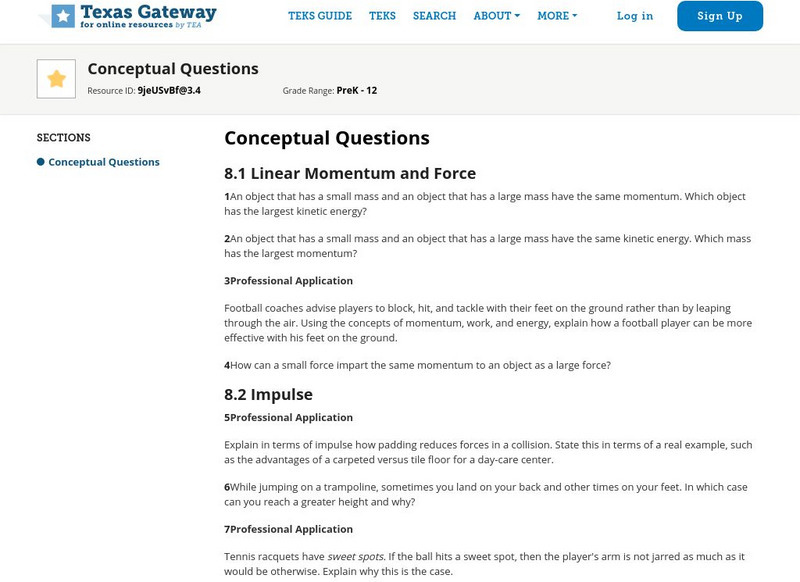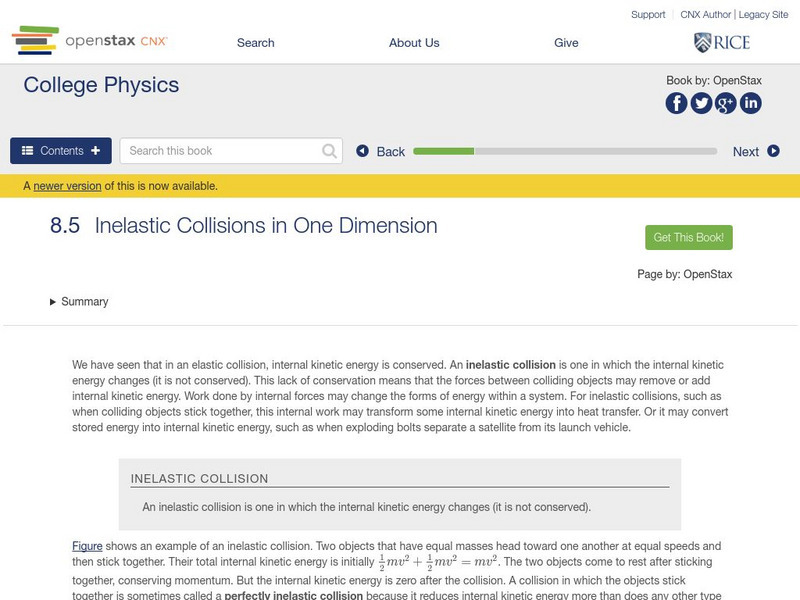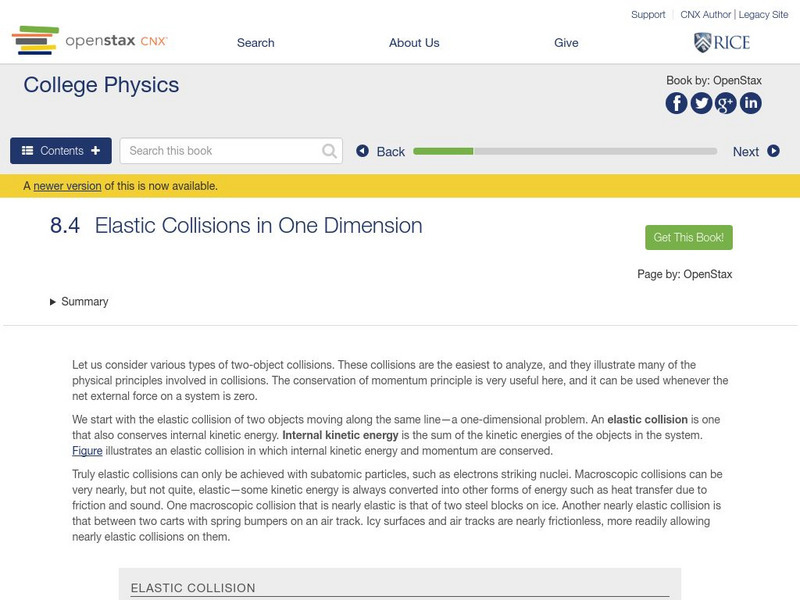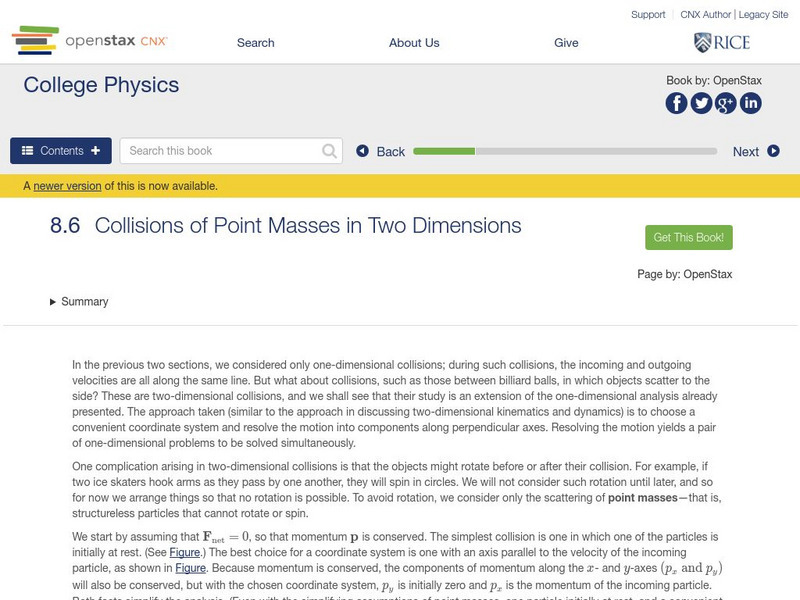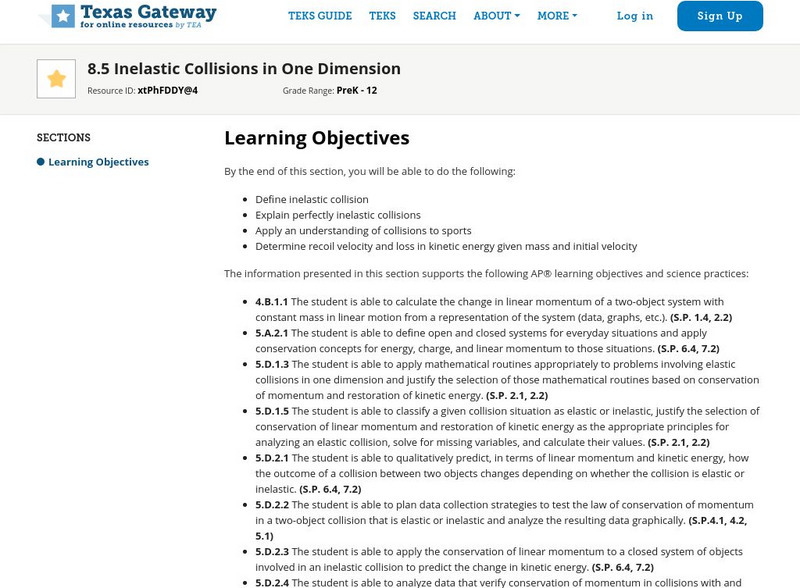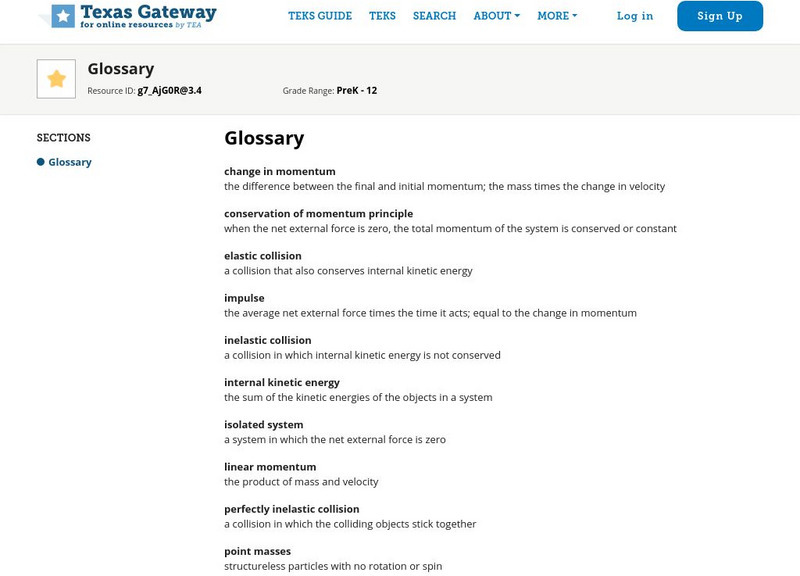Hi, what do you want to do?
Curated OER
The Higgs Boson and The Mystery of Mass
In this Higgs Boson and mass instructional activity, students read about the differences in elementary particle mass and they solve 4 equations using a given equation for the potential energy in the Higgs Boson field.
Curated OER
Automobile-Accident Reconstruction
Students investigate an accident and relate it to math. In this trigonometry lesson, students measure the accident scene, the friction produced, and the speed from the skid marks. They create a poster of their findings.
Curated OER
Transformation of Energy: Heat
Sixth graders investigate how heat is transferred and the concepts of conduction, convection, and radiation. They define key vocabulary terms, and observe teacher-led demonstrations of conduction, convection, and radiation.
Curated OER
Heat And Heat Transfer
Students role play molecules in a container as the container is heated to develop a definition of heat and temperature. They also observe demonstrations of conduction, convection, radiation, and phase transfer. Using these observations...
Curated OER
Energy Tag
Students explore how the blood flows and carries oxygent from the lungs to the heart and to the body to create energy after participating in chasing, fleeing and dodging activities. They actively move through an obstacle course...
Curated OER
Letter and Word Scramble
Learners engage in a lesson designed to encourage the identification of letters and their characteristics, as well as moving them using a variety of locomotor skills. This done using the instructional strategy of playing a game.
Curated OER
Math Challenge
Students, using laminated math flash cards, play a review game with a partner. Also using Polyspots, they run, walk, or skip to the board with their answers.
Curated OER
Geometry of Radio Meteor Reflections
Ninth graders investigate and describe ways that human understanding of Earth and space has depended on technological development. They describe and interpret the science of optical and radio telescopes, space probes and remote sensing...
Curated OER
Energy Transformation
Students identify different kinds of energy such as heat energy, kinetic energy, potential energy, and magnetic energy. They investigate the concept of conservation of energy.
Curated OER
Scooter Signal
Students practice the use of hand signals to designate right or left turns. In this safety lesson, students ride a scooter following paths set up to look like sidewalks and roads. Students practice forming the proper signals prior to...
Curated OER
How Do Airplanes Stay off the Ground?
Young scholars use balloons and string to duplicate Bernoulli's Principle of wing shape and its affect on liftoff.
Curated OER
Cartoon Challenge
Students practice locomotor movements and space awareness while reinforcing knowledge of living and non-living things learned from the classroom.
CK-12 Foundation
Ck 12 Exploration Series: Simulations: Physics: Collisions
[Free Registration/Login Required] This sim explains the concept of elastic and inelastic collision using two bumper cars. A PDF worksheet and a video tutorial are also available. [3:40]
Texas Education Agency
Texas Gateway: Collisions of Point Masses in Two Dimensions
By the end of this section, you will be able to discuss two-dimensional collisions as an extension of one-dimensional analysis, define point masses, derive an expression for conservation of momentum along the x-axis and y-axis, describe...
Texas Education Agency
Texas Gateway: Linear Momentum and Collisions: Conceptual Questions
This page features 22 questions covering the major concepts in Chapter 8: Linear Momentum and Collisions from the AP Physics online text.
OpenStax
Open Stax: Inelastic Collisions in One Dimension
From a chapter on Linear Momentum and Collisions in a Physics textbook. This section of the chapter explains what happens during a one-dimensional inelastic collision, what a perfectly inelastic collision is, collisions in sports, and...
OpenStax
Open Stax: Elastic Collisions in One Dimension
From a chapter on Linear Momentum and Collisions in a Physics textbook. This section of the chapter explains what happens during a one-dimensional elastic collision, what internal kinetic energy is and how it can be expressed, and how to...
OpenStax
Open Stax: Collisions of Point Masses in Two Dimensions
From a chapter on Linear Momentum and Collisions in a Physics textbook. This section of the chapter discusses collisions in two dimensions, what point masses are, how to calculate the conservation of momentum, what happens when two...
OpenStax
Open Stax: Collisions of Extended Bodies in Two Dimensions
From a chapter on Rotational Motion and Angular Momentum in a Physics textbook. This section of the chapter examines collisions of rotating objects in two dimensions and what happens at the point of collision. Includes examples,...
Texas Education Agency
Texas Gateway:linear Momentum & Collision: Inelastic Collisions in One Dimension
By the end of this section, you will be able to define inelastic collision, explain perfectly inelastic collisions, apply an understanding of collisions to sports, and determine recoil velocity and loss in kinetic energy given mass and...
Texas Education Agency
Texas Gateway: Linear Momentum & Collisions: Elastic Collisions in One Dimension
By the end of this section, you will be able to describe an elastic collision of two objects in one dimension, define internal kinetic energy, derive an expression for conservation of internal kinetic energy in a one-dimensional...
Texas Education Agency
Texas Gateway: Collisions of Extended Bodies in Two Dimensions
By the end of this section, you will be able to observe collisions of extended bodies in two dimensions and examine collisions at the point of percussion.
CK-12 Foundation
Ck 12 Exploration Series: Simulations: Physics: Crash Test Dummy
[Free Registration/Login Required] Learn about and explore the relationship between force, time, impulse, and momentum in collisions.
Texas Education Agency
Texas Gateway: Linear Momentum and Collisions: Glossary
This is a glossary of the terms and definitions used in Chapter 8: Linear Momentum and Collisions from the AP Physics online text.



















